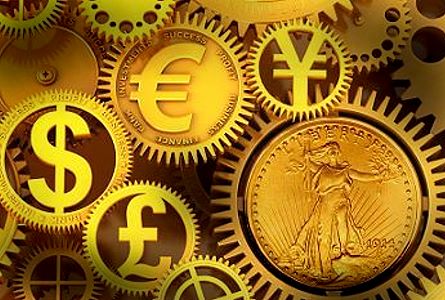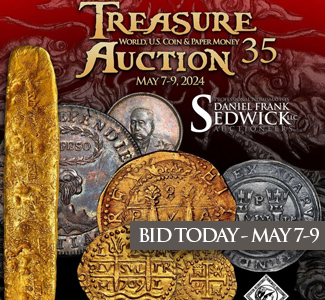by Louis Golino for CoinWeek…..
Knowledge is power when it comes to any kind of investing. There is probably no area where that is more true than precious metals, where being savvy can make all the difference between success and failure.
But being knowledgeable about the precious metal markets is not simply a matter of understanding market fundamentals and related issues. It also increasingly means that investors need to study geopolitics and macro-economic issues too, even if the connection to metals is not always immediately apparent.
>Gold investors are well advised to follow how Europe’s financial crisis is evolving especially closely because it will be a critical determinant of the price of gold in the coming months and years while euro zone countries seek to address their problems.
 In part that is because of the links between the euro-dollar exchange rate and gold that I have discussed many times in the past year. When the problems deteriorate in Europe, investors get worried about protecting their assets and seek refuge in the dollar and dollar assets, which drives gold down, and when things are going better, they feel more comfortable investing in gold.
In part that is because of the links between the euro-dollar exchange rate and gold that I have discussed many times in the past year. When the problems deteriorate in Europe, investors get worried about protecting their assets and seek refuge in the dollar and dollar assets, which drives gold down, and when things are going better, they feel more comfortable investing in gold.
But investors also need to realize that gold’s role in the international monetary system is changing in significant ways, and the euro zone crisis has a lot to do with that. Besides, it may be a mistake to continue to think of gold as a risk asset given some important changes in banking regulations that are discussed below.
Gold is now basically an alternative currency to the dollar, euro, and yen. And it is going to continue playing an increasingly large role in global monetary affairs even if there is no new gold standard at some point in the future.
Consider some important recent developments.
Central banks all over the world have continued to increase their gold holdings throughout the global financial crisis that started in 2008.
Second, as a result of some major changes in banking regulations, gold may soon be classified along with cash and a couple of others as tier 1 assets, meaning they have zero risk attached to them, as opposed to other asset classes that come with counter-party risks and other types of risks. This also means that banks can increase their scores by owning more gold. But it obviously does not mean there is no risk of gold going down in value, which can happen at any time.
Third, it is becoming increasingly more expensive for euro zone countries to borrow money to pay their debts as the yields on their bonds continue to rise. Many people know that countries like Greece, Italy, and Spain are facing this problem, but now even German yields have started to rise, albeit not that much yet.
As Simit Patel of the Market Oracle explained recently (http://www.marketoracle.co.
Germany has an historic aversion to inflation, and German Chancellor Angela Merkel has repeatedly opposed taking steps to address the crisis that might lead to inflation, such as pooling European debt obligations through the creation of what are called Eurobonds.
This leads to another important development, the idea of a European Redemption Pact, which is a proposal currently being considered by European leaders. The pact is essentially a partially gold-backed form of a Eurobond.
Germany has proposed that it could fund a European Redemption Pact in which Germany would assume responsibility for the sovereign debt of EU countries having problems. Each state would have to pledge currency and gold reserves as collateral to be used if the country were to default on its debt obligations, and if they did default, they would have to turn over their collateral to Germany.
It should be stressed that Germany has not actually agreed to any kind of Eurobond proposal not only because of concerns about inflation, but also because it worries that if it agrees to Eurobonds, the pressure for necessary structural reforms would be removed from those countries that need to make them.
Eurobonds would also apparently violate the German constitution, and the gold-backed European Redemption Fund was crafted to create a solution to Europe’s problems that could receive German backing.
But the situation in Europe would probably have to deteriorate further, perhaps in the form of a full-blown Spanish banking crisis, or Italy requesting a bailout, before Germany would actually take such as step, and the countries pledging their gold would obviously have to agree too.
Mr. Patel of Market Oracle also links the redemption pact to the idea of a gold-backed euro, which he thinks may be the only way to prevent the currency from ultimately collapsing.
He sees two basic scenarios emerging, and gold is critical to both. Basically, either the cumulative debt of euro zone countries will be aggregated into a gold-backed eurobond, or the euro will split up into multiple currencies that are backed by gold and/or silver.
In fact, Hugo Salinas-Price of Seeking Alpha (www.seekingalpha.com) has proposed that Greece leave the euro and create a new Drachma that could be redeemed for silver.
Whatever happens, three things are virtually certain.
- One, the European crisis will continue for years in one form or another.
- Two, Germany will be central to solving the crisis, although it should be noted that other EU countries like France will also bear a major share of the burden of dealing with and paying for it.
- And three, gold and silver will continue to play a larger role in global monetary affairs.
Finally, Mr. Patel also made an important observation about the long-term impact of these developments on gold’s future. As these proposals and plans move forward, governments around the world will have a stake in higher gold prices.
In the euro zone the more gold is worth, the less of it a country would need to pledge as collateral. And in other countries higher gold prices mean the country’s central bank reserves that include gold would be worth more, making a country more financially stable
This could be almost revolutionary in a way since, as my colleague Patrick Heller has often explained, governments, especially the U.S. one, traditionally see gold as a threat to the dollar and in his view work with major banks to suppress gold prices.
If gold continues to play a larger role in the international financial system, as seems almost certain, governments would seem to have an interest in keeping prices higher, not lower.
That is certainly something to think about in my view.
 Louis Golino is a coin collector and numismatic writer, whose articles on coins have appeared in Coin World, Numismatic News, and a number of different coin web sites. His column for CoinWeek, “The Coin Analyst,” covers U.S. and world coins and precious metals. He collects U.S. and European coins and is a member of the ANA, PCGS, NGC, and CAC. He has also worked for the U.S. Library of Congress and has been a syndicated columnist and news analyst on international affairs for a wide variety of newspapers and web sites.
Louis Golino is a coin collector and numismatic writer, whose articles on coins have appeared in Coin World, Numismatic News, and a number of different coin web sites. His column for CoinWeek, “The Coin Analyst,” covers U.S. and world coins and precious metals. He collects U.S. and European coins and is a member of the ANA, PCGS, NGC, and CAC. He has also worked for the U.S. Library of Congress and has been a syndicated columnist and news analyst on international affairs for a wide variety of newspapers and web sites.





Buy Gold AND Silver now while it is on sale. The day is coming soon when precious metals will take off big. Don’t miss the boat this time.